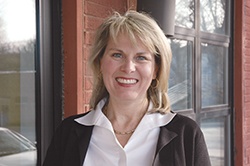Powerful Art, Generous People Inspire WAC Fundraising Exec
by February 3, 2014 12:00 am 115 views

Missy Kincaid believes the shared experience of live performance can have a life-changing effect on a person at any age.
This concept is the driving force in her role as director of donor engagement at Walton Arts Center in Fayetteville, where she fosters relationships with financial backers to support Northwest Arkansas’ foremost performing arts entity.
Kincaid recalls one moving reaction to a 10×10 Arts Series performance, where theater-goers are encouraged to write what they thought of the show on sticky notes and post them in the lobby to be read by the performers and fellow audience members.
An armed forces veteran who was given a free ticket and might not have attended otherwise, simply wrote: “I have felt nothing but anger for years. But, today, I felt love.”
To Kincaid, who previously worked in Washington, D.C., for U.S. Sen. David Pryor and in various roles under the Clinton administration, this type of response to a performance is what makes her job worthwhile. “When something like that happens, how can you not love what you do?” she said.
Kincaid, who was featured in the Northwest Arkansas Business Journal’s Forty Under 40 class in 2004, started out as a performer. As a young adult, she acted in off-Broadway shows in New York City. A Little Rock native, she started out by acting in several Arkansas Arts Center Children’s Theater performances a year as a child.
The WAC’s programs for school children make Kincaid especially proud.
“I love it when a big, yellow school bus pulls up, and the kids that get out are just wiggling with excitement,” she said.
Some of them have never seen live theater and might never attend a show at the WAC if not for the program.
“In the Starr Theater, they are so close to the action. They can see every facial expression and everything,” she said. “It’s inspiring.”
And sometimes the children are also learning — although it might not feel like it. About 50,000 students a year are reached by “Digging Up Arkansas,” an educational dramatization of the state’s history. The program, which travels throughout the state and visits WAC, was created at the request of Arkansas teachers and in collaboration with the Trike Theater, Northwest Arkansas’ professional theater for youth.
While Kincaid believes there is a profound importance in what the theater provides, she also knows it doesn’t come cheaply.
In the past, revenue from admission fees for large Broadway productions funded the arts center’s smaller programs. However, Kincaid said a steep rise in the cost of bringing these shows to the venue has changed things.
She said theater-goers might not realize while they pay $50 to see one of the larger productions, it might have cost the center $100 per patron to book it.
The nonprofit depends on its donors to make up the difference, and Kincaid said she is humbled by their generosity.
When the Great Recession hit in late 2007, many of theater’s smaller donors were no longer able to contribute, and more wealthy individuals upped their assistance to try and help fill the gap, she said.
When schools had to cancel attendance to performances because the price of fuel rose and they could not afford to travel, donors again stepped up.
“We have a very generous community,” Kincaid said.
In fact, corporations, individuals and foundations gave more than $4.5 million to the center in 2013, more than doubling the amount Kincaid said was given in 2004.
An increase in the number of programs — WAC now averages almost 400 events per year — might have helped induce the increased community support, she said.
To these performances, WAC gives thousands of tickets away through its Take A Seat Free Ticket Program to groups like the Single Parent Scholarship Fund, the Northwest Arkansas Children’s Shelter and Teen Challenge.
For Kincaid, it’s important for the public to know that the center is not going anywhere, despite the Arkansas Music Pavilion’s move to Rogers and talks of a future Bentonville location.
With $20 million in renovations on the playbill for 2016, Fayetteville will remain the home base for the theater, she said.
“This is our anchor.”
